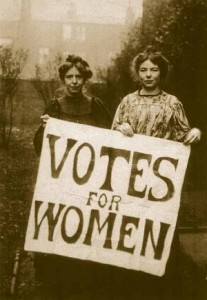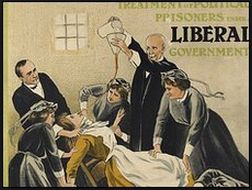Joshua Allerton completes his look at changing Britain with the War’s role in women’s suffrage. It is commonly believed that the Great War gave women the vote, but Joshua provides a more complex argument. He completes this three part article with his closing arguments and references for further reading on this fascinating subject.
After the First World War in 1918, the rights of women changed. For the first time in history a selection of women could vote, nominally those over 30 with a minimum amount of property. Their participation in the war proved that they were capable of taking on jobs, serving their country and could act as citizens. In essence, they were proving their equality.
Though it can be argued that without the First World War, the suffrage would still have happened. Before the war, “the movement for votes for women, supported by men and women was already strong… and on several occasions there had been more majorities in parliament in favour of votes for women.” (Marwick, 1991) With the suffrage almost adamant of legalisation, it is fair to say that the war had no effect except delaying the progress. (Marwick, 1991) Pre-war parliament was pushing for complete equality, votes for all women, whilst the war limited that to a select few. As a result, it is fair to claim that the war made women worse off for a small time period.
 However, the limitation can be seen as a carefully worked out tactical move to appease those men, many in the Labour party (who would later be running the country), who feared women becoming a majority in the electorate. (Holton, 1986) It helped win the last few of the opposition over. Whilst the concession was a temporary one, it was a clever move to ensure that by 1928, all women got the vote.
However, the limitation can be seen as a carefully worked out tactical move to appease those men, many in the Labour party (who would later be running the country), who feared women becoming a majority in the electorate. (Holton, 1986) It helped win the last few of the opposition over. Whilst the concession was a temporary one, it was a clever move to ensure that by 1928, all women got the vote.
On balance, it cannot be dismissed that without the war, the vote would have gone through. What the war did do though, was to give an opportunity to demonstrate the unity and skill of women to those who were unsure. Without prediction that the Labour party was to come to power, where most of the opposition lay, it was luck that the war came along to convince them and contribute to the suffrage. On that basis, it is fair to say that the First World War changed society by pushing the women’s suffrage movement.
Society was changed in Britain by the First World War in terms of population, power and wealth, and the women’s suffrage. Whilst it forced a drop in numbers, it saved Britain from depopulation by emigration. It forced the gentry to collapse and started the rolling ball of more equal wealth distribution, whilst making way for the industrialists. Finally, it contributed to the continuance of the women’s suffrage movement, enabling a chance to convince the opposition that would soon come to power.
The most significant change that happened was to the population. A country is nothing without its people and thanks to the war, Britain didn’t become a lonely island and instead prompted a baby boom. The second most significant change was the power and wealth. By removing the gentry it gave way to the lower classes to rise and have a taste of wealth and power, which is what democracy is all about. The least significant change caused by the war was the women’s suffrage. Compared to the others, this change was set in place before the war and thus had little contribution to the change.
Works Cited
Holton, S. S., 1986. Feminism and Democracy: Woman’s Suffrage and Reform Politics in Britian, 1900-1918. s.l.:s.n.
Marwick, A., 1991. The Deluge. 2nd ed. Basingstoke: Macmillian Press.
Robbins, S., 2004. British Generalship on the Western Front 1914-1918. s.l.:Taylor & Francis.
Stevenson, J., 1984. British Society 1914-45. London: Penguin Books.
Bibliography
Boyer, G. R., 2002. New Estimates of British Unemployment. The Journal of Economic History, Volume 62, p. 667.
Gazeley, I. & Newell, A., 2010. The first world war and working-class food consumption in Britian. Discussion paper series // Forschungsinstitut zur Zukunft der, Issue No. 5927.
Hancock, W. K. & Gowing, M., 1975. British war economy. s.l.:H.M.S.O.
Holton, S. S., 1986. Feminism and Democracy: Woman’s Suffrage and Reform Politics in Britian, 1900-1918. s.l.:s.n.
Marwick, A., 1991. The Deluge. 2nd ed. Basingstoke: Macmillian Press.
Robbins, S., 2004. British Generalship on the Western Front 1914-1918. s.l.:Taylor & Francis.
Stevenson, J., 1984. British Society 1914-45. London: Penguin Books.
Joshua Allerton is a freelance writer who in his spare time expresses his passion for history, whether through the traditional role of a historian or his Viking re-enactment. Constantly researching, he will be attending university in September to further his knowledge in the field.
If you are a publisher and would like to support Joshua’s works, please contact him on: jtallerton@gmail.com


